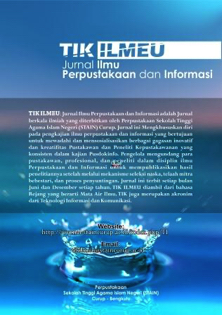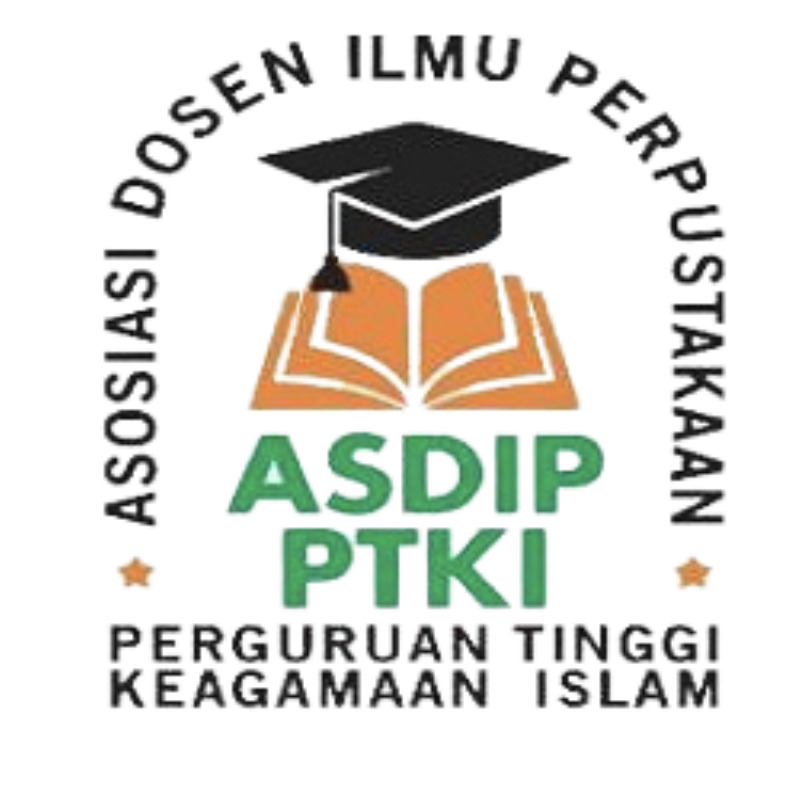Metode Analisis Wacana Teun Van Djik Dalam Penelitian Ilmu Perpustakaan Dan Informasi
DOI:
https://doi.org/10.29240/tik.v8i2.11412Keywords:
Library Science, Research TrendsAbstract
The adoption of information technology into library and information studies has shifted the research of this area into more of quantitative and statistic-driven as well as IT based research. Not that those researches are unnecesarry, but the adoption of Information Technology has diminished the role of library in the cultural context, especially in its research topics. Humanities-based approach on Library and Information Science researches have reduced dramatically in its quantity for decades considering that earlier researches of Library and Information area its in humanities. This research focuses on applying Discourse Analysis especially that of Teun Van Djik’s into Library and information science research. The paper uses qualitative method using descriptive approach. This paper finds that there are saveral topics that can be investigated and analysed by DA namely: 1) Analysing library-based policies (eg. Colection development policy). 2 Analysing certain library policies on library users, and lasty 3) analysing news on library or/and library information studies on mass media.
Downloads
References
Afida, A. (2022). Konsep Miskin Informasi dan Perpustakaan: Sebuah Analisis Wacana Michel Foucault. Maktabatuna:Jurnal Kajian Kepustakawanan.
Barata, M. F., & Simanjuntak, M. B. (2019). Strategi Publisitas dan Propaganda Politik (Studi pada Kandidat Presiden & Wakil Presiden, Jokowi-KH. Ma’ruf Amin). Jurnal Studi Komunikasi Dan Media, 23(2), 135–154. https://doi.org/10.31445/JSKM.2019.2061
Baum, M. A., & Potter, P. B. K. (2008). The relationships between mass media, public opinion, and foreign policy: Toward a theoretical synthesis. Annual Review of Political Science, 11(Volume 11, 2008), 39–65. https://doi.org/10.1146/ANNUREV.POLISCI.11.060406.214132/CITE/REFWORKS
Brännström, I., & Lindblad, I. B. (1994). Mass Communication and Health Promotion: The Power of the Media and Public Opinion. Health Communication, 6(1), 21–36. https://doi.org/10.1207/S15327027HC0601_2
Budd, J. M., & Raber, D. (1996). Discourse analysis: Method and application in the study of information. Information Processing & Management, 32(2), 217–226. https://doi.org/10.1016/S0306-4573(96)85007-2
Eriyanto. (2011). Analsis Wacana Pengantar Teks Media. Analisis Wacana Pengantar Analisis Teks Media, 200. https://books.google.com/books/about/Analisis_wacana.html?hl=id&id=cpDAPMAmimcC
Evans, G. E. 1937-, author. (2000). Developing library and information center collections. https://lib.ui.ac.id
Fairclough, N. (2013). Critical discourse analysis the critical study of language, second edition. Critical Discourse Analysis The Critical Study of Language, Second Edition, 1–591. https://doi.org/10.4324/9781315834368
Fatmawati, E. (2021). ANALISIS WACANA KRITIS DALAM LINGKUP PENELITIAN DI BIDANG PERPUSTAKAAN. Maktabatuna, 3(1), 17–38. https://doi.org/10.15548/MJ.V3I1.3162
Forrester, M. A., Ramsden, C., & Reason, D. (1997). Conversation and discourse analysis in library and information services. Education for Information, 15(4), 283–295. https://doi.org/10.3233/EFI-1997-15402
Franco-Carreño, G. (n.d.). LGBTQ: Not a Censor, but a Value.
Frohmann, B. (1994). Discourse Analysis as a Research Method in Library and Information Science. Library and Information Science Research, 16(2), 119–138.
Haider, J., & Bawden, D. (2007). Conceptions of “information poverty” in LIS: A discourse analysis. Journal of Documentation. https://doi.org/10.1108/00220410710759002
Järvelin, K., & Vakkari, P. (2022). LIS research across 50 years: content analysis of journal articles. Journal of Documentation, 78(7), 65–88. https://doi.org/10.1108/JD-03-2021-0062
Leckie, Gloria J., Given, Lisa M., Buschman, J. (2010). Critical theory for library and information science : exploring the social from across the disciplines (J. Leckie, Gloria J., Given, Lisa M., Buschman (ed.)). Libraries Unlimited. https://cir.nii.ac.jp/crid/1130282269260932736
Mccombs, M. (2002). The Agenda-Setting Role of the Mass Media in the Shaping of Public Opinion.
Mukhroman, I., Ahmad, I., & Gumelar, R. G. (2024). Pembentukan Opini Publik pada Pemilihan Umum 2024 (Studi Kasus Opini Publik – Survey Elektabilitas Capres-Cawapres 2024 Pasca Debat Pertama). Syntax Idea, 6(6), 2471–2482. https://doi.org/10.46799/SYNTAX-IDEA.V6I6.3436
Oliphant, T. (2015). Social Justice Research in Library and Information Sciences: A Case for Discourse Analysis. Library Trends, 64(2), 226–245. https://doi.org/10.1353/LIB.2015.0046
Orsborn, C. E. (2022). A Golden Age of Censorship: LGBTQ Young Adult Literature in High School Libraries.
Sampei, Y., & Aoyagi-Usui, M. (2009). Mass-media coverage, its influence on public awareness of climate-change issues, and implications for Japan’s national campaign to reduce greenhouse gas emissions. Global Environmental Change, 19(2), 203–212. https://doi.org/10.1016/J.GLOENVCHA.2008.10.005
Sulistiyo, B., Prodi, A., Komunikasi, S., Sosial, I., Univesitas, K., Satya, K., Salatiga, W., Suwartiningsih, S., S1, P., Internasional, H., & Universitas, K. (2016). PERAN MEDIA MASSA TERHADAP PEMILIH PEMULA DALAM PEMILU PRESIDEN DAN WAKIL PRESIDEN TAHUN 2014: (Studi Kasus Siswa-Siswi Kelas XII SMA Negeri 1 Salatiga). KRITIS, 25(1), 10–26. https://doi.org/10.24246/KRITIS.V25I1P10-26
Williams, V. K., & Deyoe, N. (2015). Controversy and Diversity: LGBTQ Titles in Academic Library Youth Collections. Library Resources & Technical Services, 59(2), 62–71. https://doi.org/10.5860/LRTS.59N2.62
Downloads
Published
Issue
Section
Citation Check
License
Copyright (c) 2024 Muhamad Riza

This work is licensed under a Creative Commons Attribution-NonCommercial-ShareAlike 4.0 International License.
Authors who publish with Tik Ilmeu : Jurnal Ilmu Perpustakaan dan Informasi agree to the following terms:
- Authors retain copyright and grant the journal right of first publication with the work simultaneously licensed under a Creative Commons Attribution-NonCommercial-ShareAlike 4.0 International License (CC BY-NC-SA 4.0) that allows others to share the work with an acknowledgment of the work's authorship and initial publication in this journal.
- Authors are able to enter into separate, additional contractual arrangements for the non-exclusive distribution of the journal's published version of the work (e.g., post it to an institutional repository or publish it in a book), with an acknowledgment of its initial publication in this journal.
- Authors are permitted and encouraged to post their work online (e.g., in institutional repositories or on their website) prior to and during the submission process, as it can lead to productive exchanges, as well as earlier and greater citation of published work (See The Effect of Open Access).







 This work is licensed under a
This work is licensed under a 